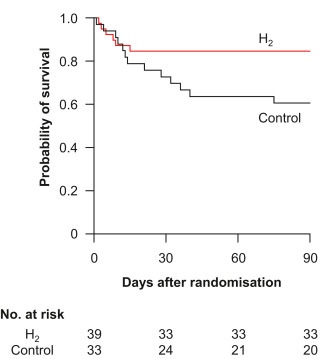
Fig. 4. Survival after out-of-hospital cardiac arrest. The figure shows Kaplan–Meier estimates of the probability of survival until 90 days after randomisation among patients assigned to receive oxygen with molecular hydrogen (H2) or oxygen alone (Control). Data are shown for the 72 patients for whom survival status was available. The event was defined as death, and data were censored at the end of each patient’s study period, i.e., at 90 days.
Cardiac arrest patients: Hydrogen gas administration improves survival rate!
– No side effects, increasing expectations for practical application –
“eClinical Medicine”:
Research by Keio University et al. was published in the academic journal “eClinical Medicine.”
Research group:
Clinical trials will be conducted at 15 hospitals in Japan for four and a half years until September 2021.
73 cardiac arrest patients:
In “73 patients who have not recovered consciousness” after being transported from cardiac arrest,
We investigated “the effect of administering oxygen containing 2% hydrogen and carrying out life-saving measures.”
Clinical trial results:
– Survival rate after 90 days –
“There was a 61% survival rate in patients receiving normal oxygen.”
“Patients who received oxygen containing hydrogen had an 85% survival rate.”
Recovery rate of sequelae:
ーPercentage of people who recovered without sequelaeー
“21% in patients receiving normal oxygen.”
46% in patients receiving oxygen containing hydrogen.
No side effects have been observed so far.
Research group:
It is said that hydrogen is harmless to the human body.
This clinical trial:
No “side effects that could be attributed to hydrogen” were observed.
If implemented, it could save the lives of many patients.
Medical DOC
https://medicaldoc.jp/news/news-202303n0543/
Patients en arrêt cardiaque : l’administration de gaz hydrogène améliore le taux de survie !
– Pas d’effets secondaires, ce qui augmente les attentes d’application pratique –
“Médecine eClinique”:
Les recherches de l’Université Keio et al ont été publiées dans la revue académique “eClinical Medicine”.
Groupe de recherche:
Des essais cliniques seront menés dans 15 hôpitaux au Japon pendant quatre ans et demi jusqu’en septembre 2021.
73 patients en arrêt cardiaque :
Chez “73 patients qui n’ont pas repris conscience” après avoir été transportés d’un arrêt cardiaque,
Nous avons étudié “l’effet de l’administration d’oxygène contenant 2 % d’hydrogène et la mise en œuvre de mesures de sauvetage”.
Résultats des essais cliniques :
– Taux de survie après 90 jours –
“Il y avait un taux de survie de 61% chez les patients recevant de l’oxygène normal.”
“Les patients qui ont reçu de l’oxygène contenant de l’hydrogène avaient un taux de survie de 85 %.”
Taux de récupération des séquelles :
ーPourcentage de personnes qui se sont rétablies sans séquellesー
“21 % chez les patients recevant de l’oxygène normal.”
46% chez les patients recevant de l’oxygène contenant de l’hydrogène.
Aucun effet secondaire n’a été observé jusqu’à présent.
Groupe de recherche:
On dit que l’hydrogène est inoffensif pour le corps humain.
Cet essai clinique :
Aucun “effet secondaire pouvant être attribué à l’hydrogène” n’a été observé.
Si elle est mise en œuvre, elle pourrait sauver la vie de nombreux patients.
DOC médical
Patienten mit Herzstillstand: Wasserstoffgasgabe verbessert Überlebensrate!
– Keine Nebenwirkungen, steigende Erwartungen an die praktische Anwendung –
“eClinical Medicine”:
Eine Forschungsarbeit der Keio University et al. wurde in der Fachzeitschrift „eClinical Medicine“ veröffentlicht.
Forschungsgruppe:
Klinische Studien werden in 15 Krankenhäusern in Japan für viereinhalb Jahre bis September 2021 durchgeführt.
73 Patienten mit Herzstillstand:
Bei „73 Patienten, die das Bewusstsein nicht wiedererlangt haben“, nachdem sie nach einem Herzstillstand transportiert wurden,
Wir untersuchten “die Wirkung der Verabreichung von Sauerstoff mit 2% Wasserstoff und der Durchführung lebensrettender Maßnahmen”.
Ergebnisse klinischer Studien:
– Überlebensrate nach 90 Tagen –
„Es gab eine Überlebensrate von 61 % bei Patienten, die normalen Sauerstoff erhielten.“
“Patienten, die wasserstoffhaltigen Sauerstoff erhielten, hatten eine Überlebensrate von 85 %.”
Heilungsrate der Folgen:
ーProzentsatz der Personen, die sich ohne Folgeerscheinungen erholt habenー
“21 % bei Patienten, die normalen Sauerstoff erhalten.”
46 % bei Patienten, die wasserstoffhaltigen Sauerstoff erhalten.
Bisher wurden keine Nebenwirkungen beobachtet.
Forschungsgruppe:
Es wird gesagt, dass Wasserstoff für den menschlichen Körper ungefährlich ist.
Diese klinische Studie:
„Nebenwirkungen, die auf Wasserstoff zurückgeführt werden könnten“, seien nicht beobachtet worden.
Wenn es umgesetzt wird, könnte es vielen Patienten das Leben retten.
Medizinischer DOC
Efficacy of inhaled hydrogen on neurological outcome following brain ischaemia during post-cardiac arrest care (HYBRID II): a multi-centre, randomised, double-blind, placebo-controlled trial
– ScienceDirect
Summary
Background
Inhaled molecular hydrogen gas (H2) has been shown to improve outcomes in animal models of cardiac arrest (CA).
H2 inhalation is safe and feasible in patients after CA.
We investigated
whether inhaled H2 would improve outcomes after out-of-hospital CA (OHCA).
Methods
HYBRID II is a prospective, multicentre, randomised, double-blind, placebo-controlled trial performed at 15 hospitals in Japan,
between February 1, 2017, and September 30, 2021.
Patients aged 20–80 years with coma following cardiogenic OHCA
were randomly assigned (1:1) using blinded gas cylinders to receive supplementary oxygen with 2% H2 or oxygen (control) for 18 h.
The primary outcome was the proportion of patients
with a 90-day Cerebral Performance Category (CPC) of 1 or 2 assessed in a full-analysis set.
Secondary outcomes
included the 90-day score on a modified Rankin scale (mRS) and survival.
HYBRID II was registered with the University Hospital Medical Information Network (registration number: UMIN000019820) and re-registered with the Japan Registry for Clinical Trials (registration number: jRCTs031180352).
https://www.sciencedirect.com/science/article/pii/S2589537023000846